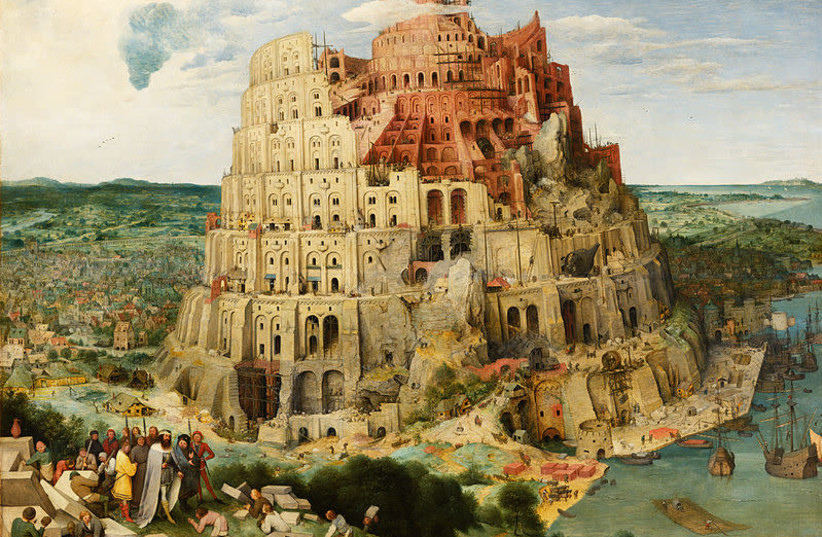Much of the misery of history could have been avoided if humanity had read, understood and absorbed the lesson of the Tower of Babel.
What was the aim of the builders of the tower? This question has received many answers.
Some argue that it was hubris, as is suggested by the phrase “make ourselves a name” (Gen. 11:4).
Rabbenu Bahya believes it was intended to function the way we would think of a lightning rod, to prevent another flood, similar to the midrash that Rashi cites, that in the wake of the flood it was intended to hold up the sky. According to such readings, the tower was a product of fear as much as ego.
In line with this, as a product of fear combined with aggression, is the view of Rabbi Jonathan Eybeschutz, that it was intended as a weapons outpost, since one could see for many miles from a tower that high in the sky.
There is clearly a connection between the flood story that precedes it and the building of the tower. Even the words “Babel” and “mabul” (flood) come from the same root.
Why would a flood induce people to build such a massive structure?
Rabbi Obadia Sforno, born in the late 15th century in Italy, understood the link differently from Rashi and others. He said the tower was intended to unify the world in a certain practice of idolatry. This explanation may be a product of the world in which Sforno lived, but it also has a great deal to say to our own world.
Remember that Italy in the 15th century, unlike anywhere else in Europe, was divided into independent city states. Therefore it exemplified a condition already present in Europe in general, which is a distribution of authority.
The eminent historian Jared Diamond makes this point about Columbus. Columbus first approached the rulers of Portugal to fund his voyage and they refused. Had Columbus been part of a single empire like that which prevailed in China, a first refusal would have been final. But he lived in Europe, where each country had its own government. Having been turned away in Portugal, he went next to Ferdinand and Isabella in Spain. They, along with private funders who also had a measure of autonomy, agreed and he set sail.

Sforno understood the power of plurality and diversity. He also understood the temptation of totalitarianism. The generation of the tower was drawn to totalitarianism, as so many after them have been, in the wake of disorder. The chaos of the flood left people shaky and uncertain. To regulate everyone – everything – seemed like a sensible solution to the anxieties of instability. Hence the tower.
What is striking is God’s solution: Enforce diversity by breaking the people up into different groups with different languages. That the builders wished to enforce pagan practices did not change the remedy – diversity in error is better than monolithic error as well. You cannot correct an error if everyone is mandated to think alike. In a uniform world, idolatry would have prevailed. Discovery demands diversity, from Abraham to the great explorers.
Throughout history people have dreamed of making humanity conform in culture or language or politics. The 20th century built such “perfect places” with the ideologies of fascism and communism. The problem with utopianism is it becomes coercive, and as Oscar Wilde memorably said, “Selfishness is not living as one wishes to live. It is asking other people to live as one wishes to live.” Except in this case it is not “asking” but demanding that others live as one does.
The blessings of pluralism are not a new realization. Judaism has learned this lesson; it is the one monotheistic faith that does not demand that others join our faith. Judaism asks others to be good, not be Jewish. From the time of the tower we have recognized that God seeks many kinds of human beings, with various outlooks and gifts, to create a varied and multicolored world.
The writer is Max Webb Senior Rabbi of Sinai Temple in Los Angeles and the author of David the Divided Heart. On Twitter: @rabbiwolpe
